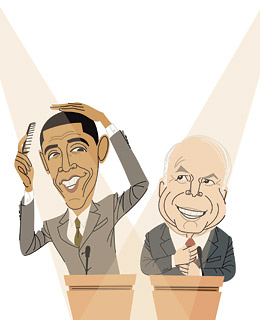
It's been a rough year for TV. The writers' strike took much scripted TV off the air, abruptly shortened the seasons of many shows and left the cupboards relatively bare for fall. But one breakout reality hit stepped into the breach: the suspenseful Presidential campaign, which boosted cable-news ratings all year and provided the networks with some of the most-watched primary debates ever. With Hollywood regrouping and Washington looming large, it's no stretch to call these three showdowns (plus one between the Vice-Presidential nominees) TV's biggest miniseries of the fall.
Modern TV debates are so rigidly formatted and cautious that they only rarely make news for what a candidate says. Instead, they're now a kind of public audition, in which voters just starting to pay attention to the election decide how much they want to see each face on TV for the next four to eight years. Ronald Reagan used his lone debate with Jimmy Carter to convince Americans that he had the standing to be President; Bill Clinton sealed the deal with Americans looking for a change (while George H. W. Bush sealed his fate by surreptitiously looking at his watch during one forum).
This time there are two nonincumbents on the stage, each looking to be cast in the same role. Neither Obama nor McCain has a reputation as a stellar traditional debater. While Obama can bring down a house giving a speech, he can turn a debate stage into a college lecture; and while McCain enjoys town halls, he tends to go stiff in a debate chair. But lowered expectations plus high stakes means both candidates stand much to gain, and lose. We dare you to touch that dial.
— James Poniewozik